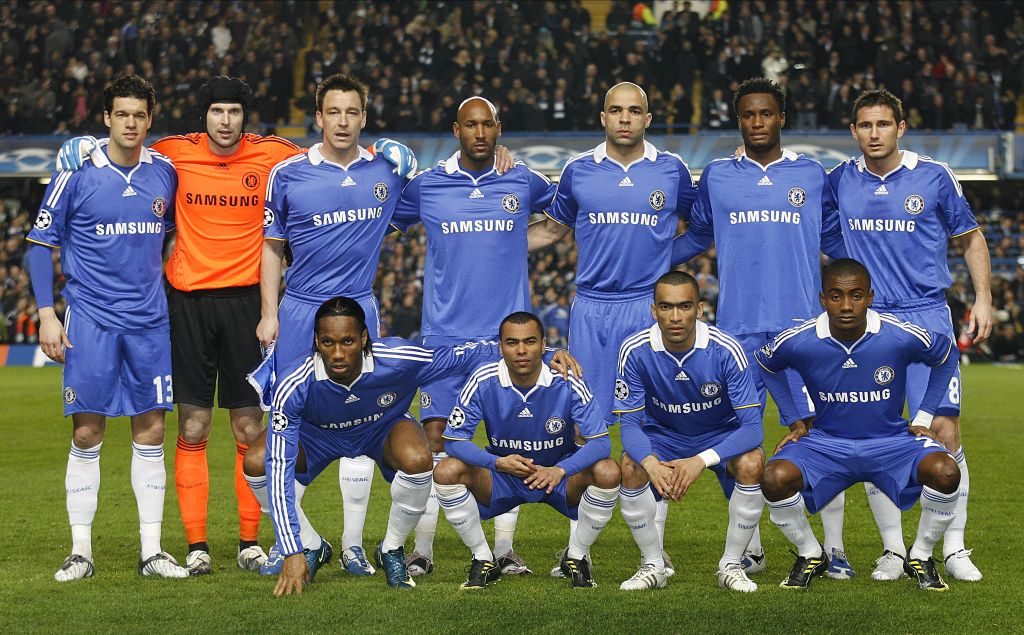Women's World Cup 2023: Dates, fixtures, stadiums and everything you need to know
Everything you need to know about the Women's World Cup 2023 in Australia and New Zealand

The Women's World Cup 2023 is just around the corner, with an expanded 32-team tournament ensuring there's even more football for everyone to enjoy.
Hosted in Australia and New Zealand, each nation heads Down Under hopeful of their chances, though only one nation can be crowned world champions. Will it be USA again, or do teams such as England, Spain or Brazil have what it takes?
It's not too late to get up to speed – here's for everything you need to know about the FIFA Women's World Cup 2023...
Where will World Cup 2023 take place?
The World Cup 2023 will be split between Australia and New Zealand. It is the first time either of the men's or women's tournaments have been held in Oceania.
Bidding to be the host nations began in February 2019, ahead of that year's tournament in France, with Australia and New Zealand initially having separate bids, before merging to create a joint proposal. Brazil, Colombia, and Japan all joined them in bidding for their first Women's World Cups, though Brazil and Colombia withdrew before the voting took place.
In June 2020, it was announced that Australia and New Zealand won 22 votes, while Japan received 13.
Women's World Cup 2023 dates and fixtures
We're back to summer for women's international tournaments after the men's World Cup 2022 winter sojourn.
Get FourFourTwo Newsletter
The best features, fun and footballing quizzes, straight to your inbox every week.
World Cup 2023 fixtures will take place between July 20 and August 20, 2023.
The group stage will kick off with both hosts playing on July 20, after which there will be three games a day until July 29. The final group stage games will see four matches a day played between July 30 and August 3.
The knockout stages begin with the round of 16 on August 5, with two games a day until August 8.
The quarter-finals will also feature two fixtures a day on August 11 and 12, while the semi-finals will take place on August 15 and 16.
The final will be hosted on August 20.
How to watch Women's World Cup 2023
Here's how to watch Women's World Cup 2023:
• UK: BBC and ITV will broadcast all of the World Cup 2023 games evenly.
• USA: Fox has broadcast rights for World Cup 2023 – without cable, you can get both channels on Sling Blue for $39.99 a month (with 50% off the first month), and Fubo TV, which is $69.99 after a seven-day free trial
• Canada: CTN and TSN will be showing all of the games.
• Australia: Optus Sport and Seven Network is showing every game of the Women's World Cup 2023
• New Zealand: Prime and Sky Sport has the broadcast rights to World Cup 2023
Can I watch the Women's World Cup 2023 for free?
With a TV licence, viewers in the UK can watch the Women's World Cup 2023 for free on BBC and ITV. A full schedule of each group game is available below.
Australia will be showing the World Cup on free-to-air channels.
American soccer fans can get a seven-day free trial on Fubo TV.
How to watch Women's World Cup 2023 in the UK
Semi-final, Wednesday August 16
Australia vs England (BBC One and BBC iPlayer - 11am BST)
Third-place play-off, Saturday August 19
Sweden vs Australia (BBC One, BBC iPlayer - 11am BST)
Final, Sunday August 20
Spain vs England (BBC One, BBC iPlayer, ITV 1 & ITVX - 11am BST)
Wallchart
FourFourTwo Women's World Cup 2023 wall chart: Download at home version
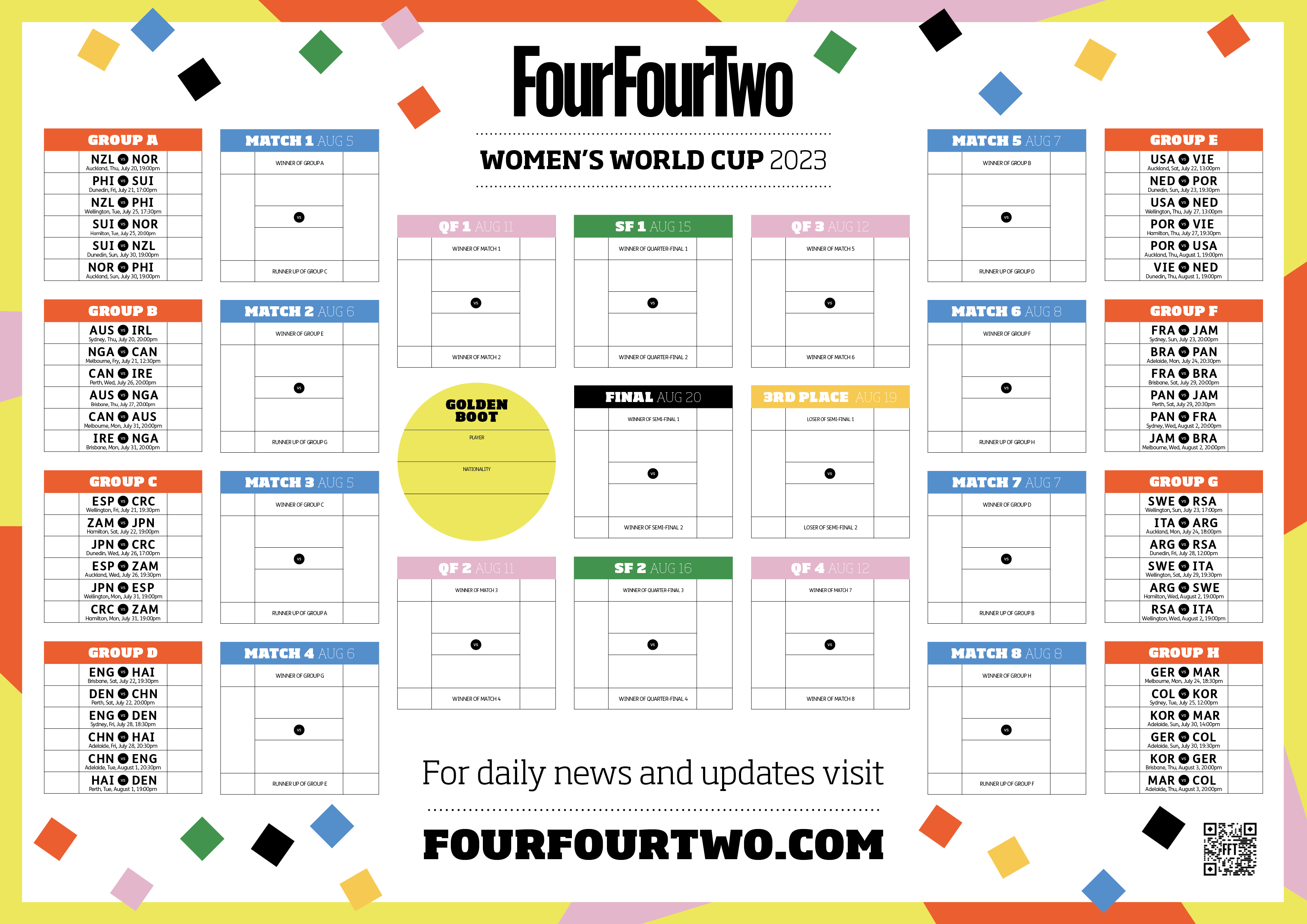
FourFourTwo Women's World Cup 2023 wall chart: Download at home black and white version
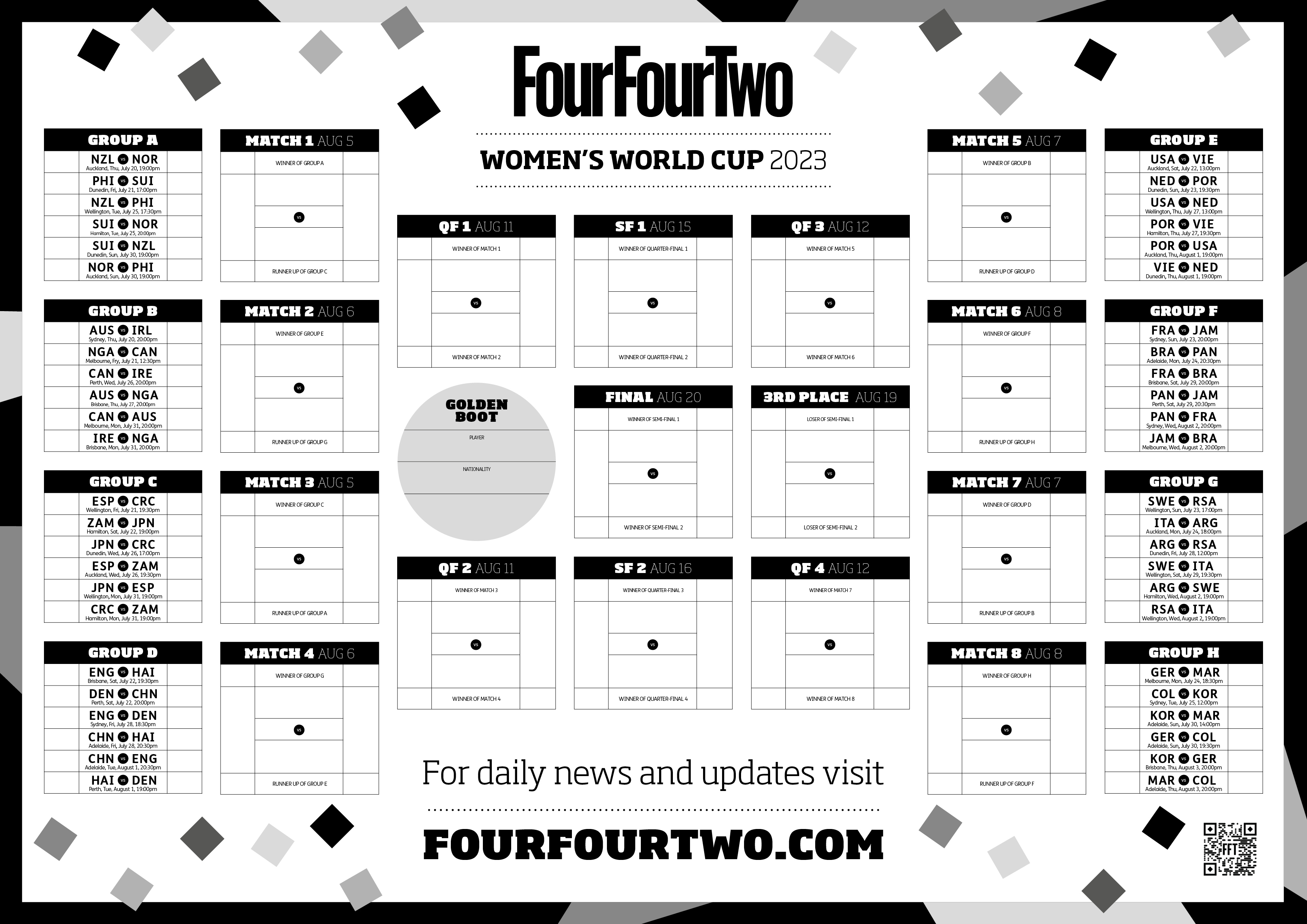
Which countries have qualified for the Women's World Cup 2023?
Who has qualified for the Women's World Cup 2023? Details of all 32 teams who have made it to the finals are below:
- Australia (co-hosts)
- China
- Japan
- Philippines
- South Korea
- Vietnam
- Morocco
- Nigeria
- South Africa
- Zambia
- Canada
- Costa Rica
- Jamaica
- United States
- Argentina
- Brazil
- Colombia
- New Zealand (co-hosts)
- Denmark
- England
- France
- Germany
- Italy
- Netherlands
- Norway
- Republic of Ireland
- Spain
- Sweden
- Switzerland
- Haiti
- Portugal
- Panama
How many teams will be at the Women's World Cup 2023?
There will be 32 teams competing at World Cup 2023, a new expanded format from the previous 24. This replicates the format of the men's tournament since 1998, although that itself will soon expand to 48 teams.
When will the Women's World Cup 2023 squads be announced?
The majority of teams have revealed their final squads ahead of the tournament in Australia and New Zealand, with a select few still waiting to confirm their final 23 players.
What are Women's World Cup 2023 groups?
Group A
New Zealand
Norway
Philippines
Switzerland
Group B
Australia
Republic of Ireland
Nigeria
Canada
Group C
Group D
Group E
United States
Vietnam
Netherlands
Portugal
Group F
Group G
Sweden
South Africa
Italy
Argentina
Group H
Germany
Morocco
Colombia
South Korea
What will the Women's World Cup 2023 kick-off times be?
With Australia and New Zealand the joint hosts, World Cup 2023 kick-off times will be spread across four different time zones – so strap in, because this might get a little complicated.
The times zones are UTC+8, UTC+9.30, UTC+10 and UTC+12. For context, in summer, these are where other time zones are in relation to Coordinated Universal Time: British Summer Time (BST): UTC+1; Eastern Daylight Time (EDT): UTC-4; Pacific Daylight Time (PDT): UTC-7.
UTC+12 kick-off times (New Zealand matches)
The World Cup 2023 opening fixture and all other Group A, Group C, Group E and Group G games take place in New Zealand's UTC+12.
Another four knockout matches will also be held in New Zealand.
Their kick-off times are split between:
12pm – 1am BST, 8pm EDT, 5pm PDT
1pm – 2am BST, 9pm EDT, 6pm PDT
5pm – 6am BST, 1am EDT, 10pm PDT
5.30pm – 6.30am BST, 1.30am EDT, 10.30pm PDT
6pm – 7am BST, 2am EDT, 11pm PDT
7pm – 8am BST, 3am EDT, 12am PDT
7.30pm – 8.30am BST, 3.30am EDT, 12.30am PDT
8pm – 9am BST, 4am EDT, 1am PDT
UTC+10 kick-off times (Sydney, Melbourne and Brisbane matches)
This is the second-most common timezone for the group stage, with 15 goup games happening in Sydney, Melbourne or Brisbane.
A further 10 knockout matches also take place in UTC+10, including one semi-final and the final itself.
All of the matches in Group B and a number of games from groups D, F and G take place in the UTC+10 timezone.
This includes England's first two group games, while their third group game is in UTC+9.30 (see below).
12pm – 3am BST, 10pm EDT, 7pm PDT
12.30pm – 3.30am BST, 10.30pm EDT, 7.30pm PDT
6.30pm – 9.30am BST, 4.30am EDT, 1.30am PDT
7.30pm – 10.30am BST, 5.30am EDT, 2.30am PDT
8pm – 11am BST, 6am EDT, 3am PDT
UTC+9.30 kick-off times (Adelaide matches)
Four group stage games are being hosted in Adelaide, including England's third match, as is one of the round of 16 games.
2pm – 5.30am BST, 12.30am EDT, 9.30pm PDT
8.30pm – 12pm BST, 7am EDT, 4am PDT
UTC+8 kick-off times (Perth matches)
There are five group stage games taking place in Perth in groups B, D, F and H
6pm – 11am BST, 6am EDT, 3am PDT
7pm – 12pm BST, 7am EDT, 4am PDT
8pm – 1pm BST, 8am EDT, 5am PDT
8.30pm – 1.30pm BST, 8.30am EDT, 5.30am PDT
What are the Women's World Cup 2023 kick-off times in the UK?
There are 17 different Women's World Cup 2023 kick-off times. In the UK, you'll be able to watch matches at the following times:
• 1am
• 2am
• 3am
• 3.30am
• 5am
• 6am
• 7am
• 8am
• 8.30am
• 9am
• 9.30am
• 10.30am
• 11am
• 12pm
• 1pm
• 1.30pm
What are the World Cup 2023 stadiums?
These are the World Cup 2023 stadiums:
• Stadium Australia, Sydney: 83,500
• Sydney Football Stadium, Sydney: 42,512
• Lang Park, Brisbane: 52,263
• Melbourne Rectangular Stadium, Melbourne: 30,052
• Perth Rectangular Stadium, Perth: 22,225
• Hindmarsh Stadium, Adelaide: 16,500 (expanding to 18,435)
• Eden Park, Auckland: 48,276
• Wellington Regional Stadium, Wellington: 39,000
• Forsyth Barr Stadium, Dunedin: 28,744
• Waikato Stadium, Hamilton: 25,111
The Final
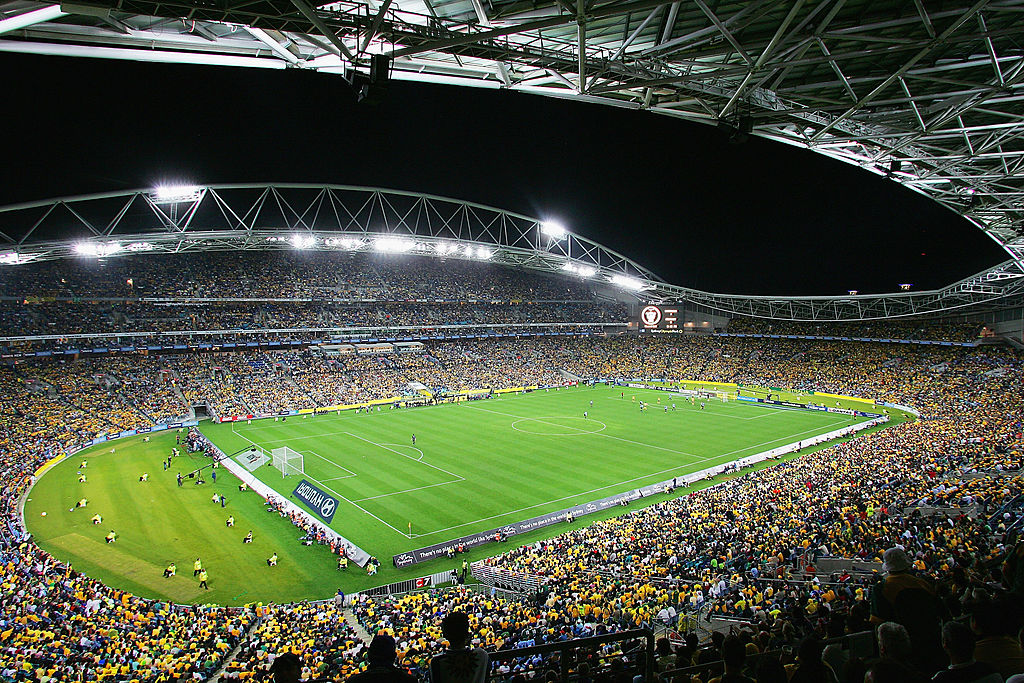
Stadium Australia in Sydney will host the final of the Women's World Cup 2023 between England and Spain on Sunday 20 August, at 11:00am BST.
Known as the Accor Stadium for sponsorship purposes, the 83,500 capacity stadium opened in 1999 and hosted the 2000 Summer Olympics. It also hosted the final of the 2015 AFC Asian Cup, with other sports such as rugby league, rugby union, cricket and Australian rules football regularly played there, too.
Are Women's World Cup 2023 tickets on sale?
Tickets – or 'Single Match Passes', as FIFA is calling them – are back on sale for the 'Last Minute Match Pass' as of April 11 2023 from the FIFA website. Tickets initially went off sale on March 3.
What is the Women's World Cup 2023 official ball?
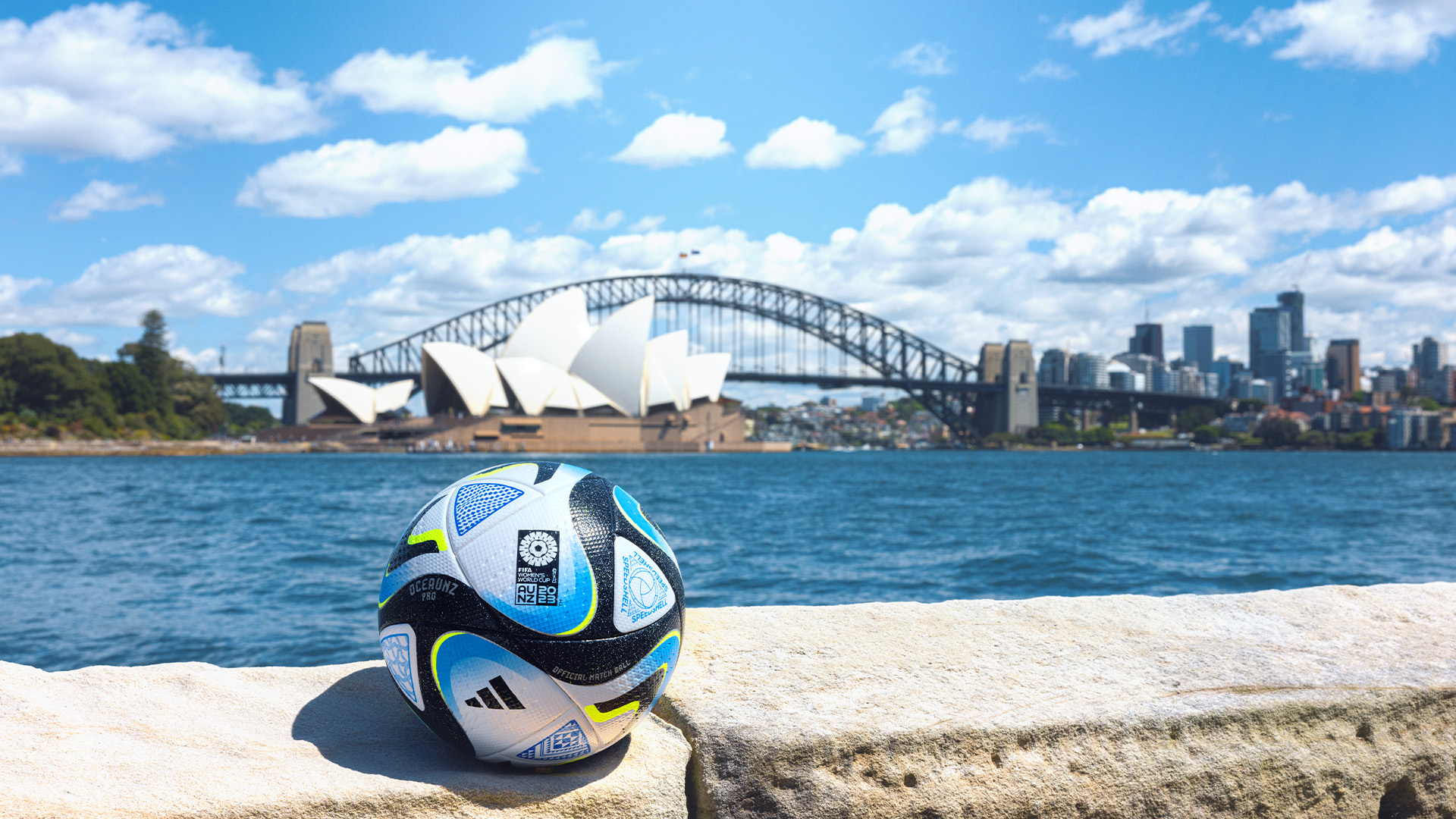
In January 2023, Adidas revealed the Oceaunz, the official matchball for the 2023 World Cup.
According to Adidas, "Oceaunz’s design features a decoration of blues and greens,inspired by the unique Australasian landscape, with visuals nodding to the vast mountains of New Zealand and Australia’s connection with the Indian Ocean."
And if you were wondering about the funny spelling, it's because it incorporates the initials of both Australia and New Zealand. Clever, eh?
What is the Women's World Cup 2023 official mascot?

Tazuni is the official mascot of the Women's World Cup, and is a teenage penguin designed to inspire the next generation of football fans. The name Tazuni is a fusion of her home in the Tasman Sea and unity, which FIFA describes as "a key value of the event to be co-hosted by Australia and New Zealand".
Tazuni is based on the ‘Eudyptula minor’ species endemic to Aotearoa New Zealand and Australia, and features a signature blue tuft of hair.
Who are the Women's World Cup 2023 favourites?

The standout from the Women’s World Cup 2023 favourites are undoubtedly the United States. The Americans have long been the powerhouses of women's football and the bookies are heavily backing them to win a fifth World Cup title.
But it's far from a foregone conclusion in Australia and New Zealand this summer.
Not since 2007 has the Women's World Cup been won by a European team but there are a number who will fancy their chances against a USWNT in flux – not least Euro 2022 winners England. Germany, France, Spain, Sweden and the Netherlands are also all strong, and head into the tournament confident of a strong performance.
Australia will also be hoping to lift the trophy in Sydney in front of home fans, meaning everything is definitely to play for.
Odds:
USA - 5/2
England 7/2
Spain - 6/1
Germany - 7/1
France - 10/1
Australia - 12/1
Who will win the Women's World Cup 2023 golden boot?
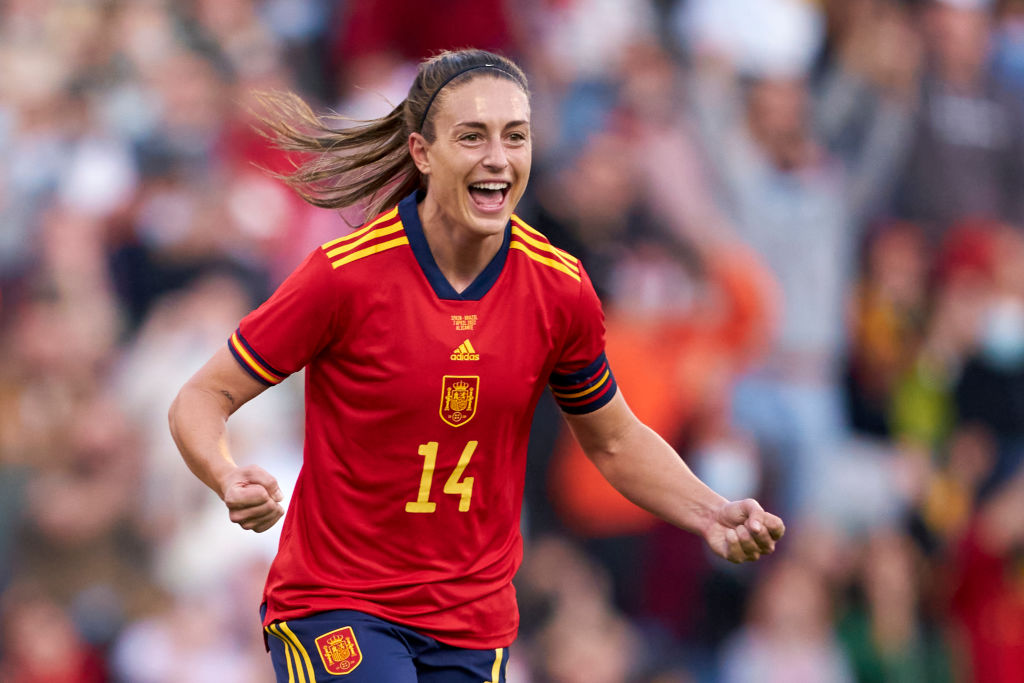
The Women’s World Cup 2023 Golden Boot race could be fascinating with a huge number of very talented goalscorers heading to Australia and New Zealand.
While there will be some notable players not at the tournament – for example, Euro 2022 Golden Boot winner Beth Mead is unlikely to make it, and nor will two-time Women’s Super League Golden Boot winner Vivianne Miedema – there are plenty of others who will feel like they could help fire their country to both individual and national glory.
Sam Kerr, Megan Rapinoe, Ada Hegerbg, Alex Morgan, Alexia Putellas, Marta, Alex Popp, Rachel Daly and Bunny Shaw, among plenty of others, will all be in the running for the top scorer gong.
What will the weather be like at the 2023 Women's World Cup?
The temperature at the Women's World Cup will vary depending on the location of the matches, due to the tournament being split across Australia and New Zealand. Australia has a diverse climate, and will host matches in various cities, including Sydney, Melbourne, Brisbane, and Adelaide. These cities generally experience warm, but not hot, weather during Australia's winter months, with temperatures ranging from 15 to 26 degrees Celsius. Players and spectators can expect cooler days and blue skies, perfect for enjoying the beautiful game.
Meanwhile, New Zealand will showcase matches in cities including Auckland, Wellington, and Christchurch. The tournament will take place during New Zealand's winter as well, but the weather will be milder still compared to Australia. Temperatures in these cities are likely to range from 12 to 16 degrees, offering pleasant playing conditions for the teams but chillier temperatures for spectators.

Conor Pope is the former Online Editor of FourFourTwo, overseeing all digital content. He plays football regularly, and has a large, discerning and ever-growing collection of football shirts from around the world.
He supports Blackburn Rovers and holds a season ticket with south London non-league side Dulwich Hamlet. His main football passions include Tugay, the San Siro and only using a winter ball when it snows.
- Ryan DabbsStaff writer
